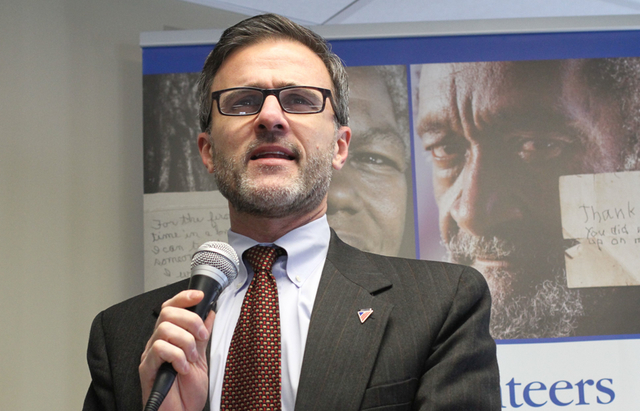A helping hand with a business card might beat a handout for some
I haven't seen an "I Will Work for Food" sign lately, which could mean any one of four things:
a) The people holding those signs were getting too many undesirable job offers.
b) Panhandlers dislike cliches as much as anybody.
c) They don't really want food; they want money.
d) The lexicon of panhandling has evolved to favor the more direct approach - the verbless label sign: "Unemployed, Homeless Veteran" or "Hungry Mother of Three," or "Out of Work Disabled Father."
What would Jesus do? Picture this scenario: Exiting from a freeway in his 20-year-old Volkswagen minibus, Jesus stops for a red light at a surface-road intersection, and notices a disheveled sign-holder standing just a couple of yards from his side-view window, advertising dire need, asking for any help. Jesus would give the sign-holder His business card, right? Well, maybe not, but Patrick Patterson would.
Patterson is executive vice president of Volunteers of America Michigan, and an incurable do-gooder by nature. I know this because when I was writing a daily column for the Lansing State Journal I wandered occasionally into do-gooder territory, where I frequently crossed paths with Patterson. I liked him because, unlike many do-gooders, he never took himself too seriously. He had a healthy sense of humor about the VOA's mission. He harbored no illusions about the nature of his clientele, yet went about his business with enthusiasm and compassion.
Patterson has given a lot of thought to the sign-holders. A recent letter from Patterson to me, and others, begins: "It's a question I hear all the time: 'What should I do when I pass one of those guys on the street corner with the cardboard signs begging for money?'"
Maybe you've asked yourself the same question. I have, and my answer always is: "Nothing."
Can a person be reasonably certain that few bucks passed through an open car window will be spent on food, and not crack, or wine, or lottery tickets? Of course not. So, does the possibility that our donations might do more harm than good give us a license to keep our car window closed and ignore the beggars?
As you might suspect, Patterson doesn't think so. "My experience," he wrote, "shows that begging often comes from a genuine, desperate need. Even the drinkers usually have significant challenges, revealed once we build a relationship."
Patterson acknowledges, however, that dollars dispensed by passing motorists will do nothing to address those challenges. Hence, Patterson's new approach: the VOA business card. The cards declare "We want to help," and list all of VOA's offerings: "a safe place to sleep," "hot, nutritious meals," "showers," "eviction assistance," etc. The cards also include a map to the VOA offices, the phone number, the hours of operation, and even instructions regarding bus routes to the shelter.
The cards are available to anyone who wants them. Patterson wants us to pass them out to street beggars – the ones with signs and the ones who approach us directly. Yes, he knows that many of the cards won't make it as far as the nearest trash can, but he prefers to dwell on the possibility that one or two might land on fertile ground, and that a life will be saved.
"This just might click with somebody's heart," Patterson told me in a recent interview. That's the way he thinks.
He added: "We've had miraculous stories from this kind of outreach. We've seen some miraculous changes."
As usual, VOA has no money to fund this current outreach effort. It's a volunteer effort.
The reaction of panhandlers so far to the business cards?
"All kinds," Patterson said. "Sometimes they start a conversation."
And sometimes they don't. Patterson knows as well as anybody that the miracles are few and far between, but searching for them is both his profession and his hobby.
He wrote: "We routinely save folks who have been deemed hopeless. Their recovery against all odds continues to inspire me."
During our interview Patterson added: "I feel we have an obligation to make the effort. These people are still our brothers and sisters."
See what new members are saying about why they donated to Bridge Michigan:
- “In order for this information to be accurate and unbiased it must be underwritten by its readers, not by special interests.” - Larry S.
- “Not many other media sources report on the topics Bridge does.” - Susan B.
- “Your journalism is outstanding and rare these days.” - Mark S.
If you want to ensure the future of nonpartisan, nonprofit Michigan journalism, please become a member today. You, too, will be asked why you donated and maybe we'll feature your quote next time!


 Pat Patterson gives handouts to beggars on street corners, but not of money. (Courtesy photo)
Pat Patterson gives handouts to beggars on street corners, but not of money. (Courtesy photo)